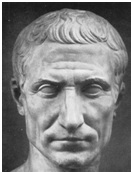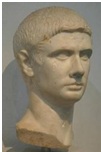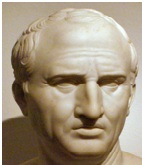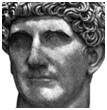|
 |
|
 |
|
|
||
Julius Caesar Leadership
Roman leader who conquered Gaul (France), Germany and Britain. Murdered by a group of conspirators on the Ides of March (March 15). The month of his son’s birth was re-named Julius (July in English). Caesar (pictured right) changed the Roman calendar into a 365 day year, the basis of our modern Gregorian calendar.
For more detail see... The Assassination of Julius Caesar in the History Highlights section.
Why was he a great leader?
1. Popularity He was immensely popular with the middle and lower classes, because he:
2. Power He was a highly egotistical lover of power, who was the first living Roman to appear on a coin and became a dictator for life in 45BC, ending the democratic Roman Republic. This is why his friend, Brutus (pictured right), helped to kill him.
3. Decisiveness In 49 BC he crossed the river Rubicon into Italy, so invading it and starting a civil war, which he eventually won. “The die is cast”, he said, as he crossed the river.
4. Military genius He was one of the greatest military leaders ever, successfully fighting in any terrain and weather conditions. He made the best possible use of his superb infantry, cavalry and artillery. His army’s engineering skills (building fantastic roads) and speed were legendary. It marched as many as 40 miles a day, when 20 was considered phenomenal. Belgium was the only country to give him much resistance. He conquered Pharnaces in Asia Minor (now Turkey) in just five days in 47 BC, prompting him to say, “Veni, vidi, vici” (Latin for “I came, I saw, I conquered).
5. Great troops He inspired his troops (like those pictured right) through:
6. Character and
ability The Roman writer, Cicero (pictured right), thought that he was an extraordinary man: “calm, kind, clever, forward-looking and fair”. Caesar was largely a self-made man without the privileges of great wealth and an aristocratic family. He trained as a lawyer before joining the army and was a great speaker, travelling to Rhodes in 75 BC to study philosophy and oratory under Cicero’s teacher. He also won over his rivals by pardoning them.
7. Tough and ruthless He had to fight for power and resolutely held on to it in the face of constant opposition and intrigue, culminating in the plot to kill him. He was also ruthless in politics and war. After defeating the last city in Gaul by siege, he cut off the hands of all its survivors and scattered them throughout Gaul!
8. Teamwork Despite his desire to be a dictator, he needed the help of political allies. He formed the First Triumvirate in 70 BC with Crassus and Pompey. He also formed an alliance with his lover, Cleopatra (pictured right), and allowed Mark Antony (pictured right below), to take charge of Italy, whilst pursuing Pompey to defeat him in 48 BC. 9. Relaxation He collected pieces of art, and was a brilliant writer. His best works are his war diaries.
10. Learning with confidence He learned from his mistakes and quickly recovered from setbacks, never doubting his ability to succeed. Deep reflection also improved his thinking.
Key quotes on creativity Creating is the essence of life.
Key quotes on change We have not to fear anything, except fear itself (similar to Franklin D. Roosevelt’s statement, “The only thing we have to fear is fear itself”). As a rule, men worry more about what they can’t see than about what they can.
Key quotes on learning and wisdom Experience is the teacher of all things. What we wish, we readily believe, and what we ourselves think, we imagine others think also.
Key quote on decision making All bad precedents began as justifiable measures.
Key quotes on leadership A good commander should be able to gain as much by policy as by the sword. Veni, vidi, vici (I came, I saw, I conquered). I love the name of honour more than I fear death. |
|
|
||
|
|
||
| Copyright © wisdomtowin.com 2025 All Rights Reserved | ||
|


 Julius Caesar (100-44 BC)
Julius Caesar (100-44 BC)




